|
I know that one of the hymns for Pentecost uses the noun finger, but my adventures surrounding this word today have had nothing to do with that.
As I left chapel and made my way to the front desk for my shift, one of my morning duties was turning on the music in the lobby, where I also opened the shades and windows, to let in sunshine and fresh air. One of the windows, however, did not stay open; instead it fell shut, with great force, on my right index finger. Ouch! I danced around a bit, and went on with my morning, practicing some for the vocal music I would need to help lead at Mass. Sr. Elaine and I had decided to play together for today’s great feast, and had even practiced last evening. We have two keyboards in our chapel, and years ago, we used to do this for great feasts. It was nice to revive that custom. When I got back to chapel, though, right before Mass, the finger injury represented itself as a hindrance. Successfully striking a match is not so easy with an injured finger. I soon learned that playing organ/keyboard is also a bit more challenging under such circumstances. I made it through pretty well, though, using other fingers in the injured finger’s stead and occasionally even using the poor index finger. The music went alright, except for the fact that by the time I was finished singing the sequence, I didn’t have much air left and had to read rather than sing the gospel verse. At the end of Mass, after the closing song, a few of us chanted the Veni Creator Spritus, which we’ve been planning and practicing for a number of weeks. As this day and week goes on, I need to continue my prayers for the Holy Spirit’s guidance in my life as well as in my workplace and world. I’d better stop typing now, though, because my finger is starting to throb. Happy Pentecost!
1 Comment
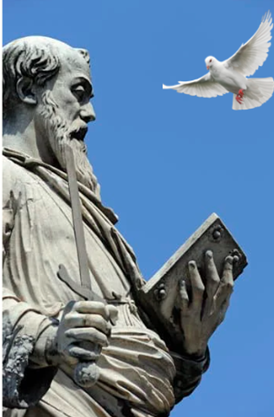 In praying with this morning’s readings, a couple of points in the passage from Acts stood out to me. The letter and exhortation from the first council of the Church, that of Jerusalem, among other things instructed the gentile Christians to abstain from the meat of strangled animals. I couldn’t help but wonder why this was considered important. There are some different explanations offered for this, but I guess, of greater importance is the other point that really struck me. According to the comments of “the apostles and presbyters” in this important gathering, the reason for this session was to restore the peace of mind of the gentile believers who had been upset by other teaching and whose peace had been disturbed. The Council met to determine what should be required of these converts, and they settled on some minimal requirements. I found it interesting that this Church directive (if you follow my logic here) was given to restore peace. Wouldn’t it be great if more people today saw Church teachings as instruments of peace, as given for our welfare, rather than seeing them as restrictive or in a negative light? During these days as we prepare for Pentecost, might one of our prayers be that the Holy Spirit would enlighten more hearts with an appreciation for the Church’s motherly guidance for our lives? Another prayer might be that each of us, by our gentleness and kindness, as friends of Christ, might be instruments of His peace to hearts that are troubled. 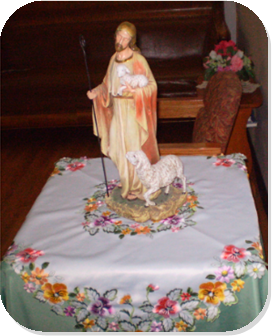 This morning, as Father was praying the Collect, a phrase stood out to me: “The brave shepherd.” In this prayer, he also referred to us as the humble flock and to Jesus as the brave shepherd. Brave isn’t an adjective that I usually associate with Our Lord, but it really should be. As I thought about it more, I realized what heroic courage it must have taken for Him to undergo His passion and death willingly, when He easily could have said “No thanks; I don’t think I’m up for it.” This bravery of Jesus speaks to me as I am faced with challenging circumstances which are pretty much out of my control. How do I face difficult days? Do I run to my room and hide, or do I turn to my “brave shepherd,” relying on His grace and strength. Unlike Him, left to myself, I do not have what it takes to deal with my crosses. However, as I prepare for Pentecost, I am reminded to ask Him to send His “Spirit of wisdom and understanding…of right judgment and courage,…of knowledge and reverence” (Rite of Confirmation) to help me. I need this “Gift of God Most High” to guide, strengthen and sustain me on the journey to where “the brave Shepherd has gone before.” This guiding, shepherding presence was certainly with me last night as, despite my weariness, I was intent on getting a little table with the Good Shepherd statue set up behind the office for today’s “Good Shepherd Sunday.” Sr. Rebecca had always done this before, and I hadn't been able to locate the soft green cloth that she used. Dealing with another situation that I had not bargained for (and about which I was less than excited), I happened to go with a coworker into Sr. Rebecca’s storage room. There, sitting out, was the lovely green cloth that she had always used (or one that certainly resembled it). I spotted it with delight! After a little work, I had it on the table and a decorative square cloth even in place. It will stay there for several weeks, if not months! Now, whenever I pass by this area, I can be reminded of the brave Shepherd, on whose grace and help I am completely dependent. 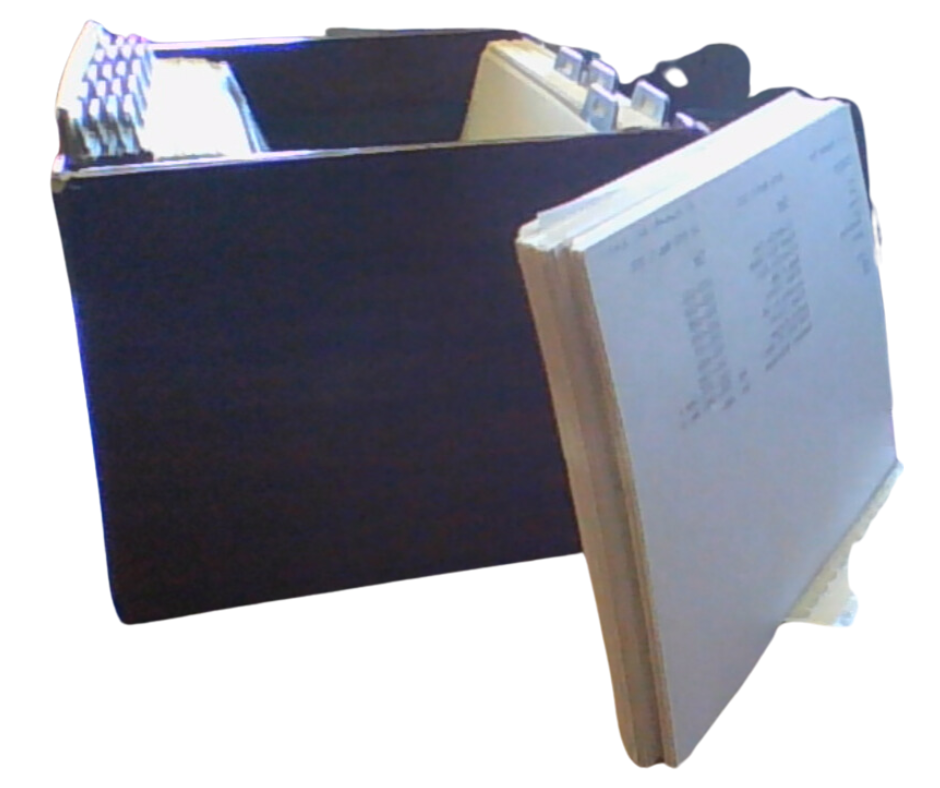 This morning at Mass, Father reminded us of the importance of giving thanks. The true meaning of this national holiday isn’t given the prominence it really deserves. With Christmas decorations already up in many places, and big sales underway, one can easily forget the thanks giving part of this fourth Thursday in November. In speaking of the grateful leper in today’s gospel, Father pointed out that the Greek word used to refer to his action was Eucharisteo. As Catholics, that should sound very familiar to us. After all, we come together to participate in the Eucharist on a regular basis. As you may know, this familiar sounding Greek word means: “He gave thanks.” The Samaritan leper in today’s passage from Luke gave thanks for his healing, when his comrades did not. (How often I fail to give thanks to God for the many blessings I receive each day!) Though I’m no scholar of ancient languages, I think the connection given us in the word used for the Sacrament of Sacraments, the Source and Summit of the Christian life, should definitely be a clue for us. If eucharistia is at the very center of our faith, what does that tell us about the importance of gratitude to God should have in our lives? I think this word gives us a glimpse into Christ’s own heart. The sacrifice of the Mass, which re-presents the paschal mystery for us, is an offering of thanksgiving to the Father. Jesus wants us to be part of this thanksgiving. Our thanksgiving, however, need not end when we walk out the church doors into a wintry morning. It can, and should, become a habit throughout our day. Thanksgiving is a pretty big deal! 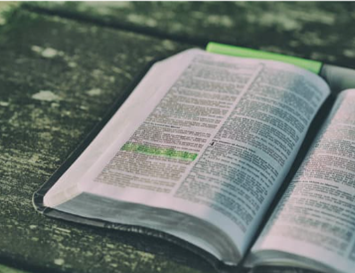 As I glanced over Tuesday’s Mass readings, the refrain of the assigned responsorial psalm caught my attention: “Let your mercy come to me, O Lord.” What a simple, yet beautiful prayer! It resonated deeply in my heart, which has been heavy again of late, amidst some challenging days and circumstances. This experience, which I will have to delve into more deeply during my prayer time tomorrow, is evidence of the quote from Hebrews, which is used in the gospel acclamation: “The word of God is living and effective, able to discern reflections and thoughts of the heart.” I am grateful for this word, alive in our lives, which helps bring us to the freedom Christ offers, as St. Paul so beautifully stated in tomorrow’s epistle: “For freedom Christ set us free.” In closing, may I ask for your prayers in these challenging times, that His mercy may come to me in abundance? 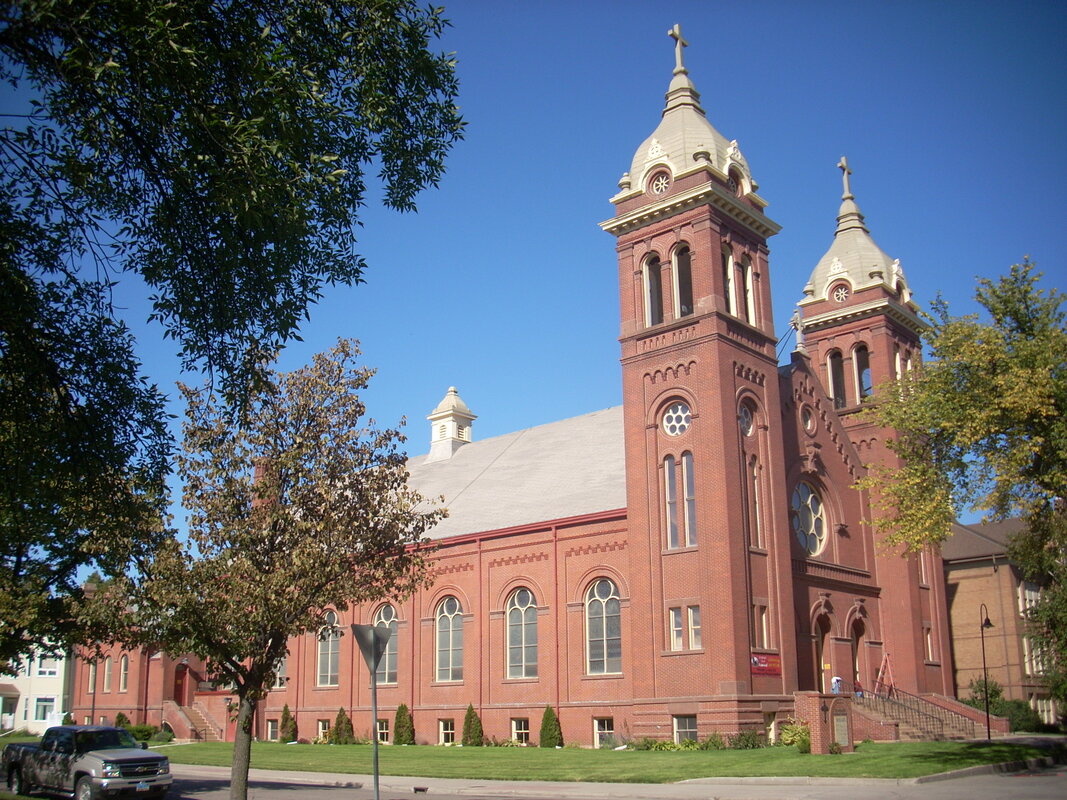 Thursday evening, I was happily able to help sing for a “Night of Praise” (Exposition of the Blessed Sacrament accompanied by some music). I love this combination of music with adoration! It’s a little bit of heaven on earth, as I told a friend afterward. Earlier in the week, I’d gotten an email from the liturgy coordinator asking us to meet in the bell tower to practice a bit beforehand. I had to ask him how to get there, as I’m kind of a rookie at this! After a little practice, we went to the choir loft, where we spent the beautiful hour. One word struck me through this experience: blessed. A couple of the songs we sang centered around this theme of “blessing the Lord.” Furthermore, I felt truly blessed by this opportunity. Later in the evening, during another conversation, I got to musing about the significantly different uses of the word blessed. To me, it almost seemed a bit strange that the same word had such contrasting uses, though they all share positive connotations. We pray “Bless us…and these your gifts.” We say, “I am blessed by so many good things.” We sing, “Bless the Lord, O my soul.” As I thought about this linguistic enigma a bit more, I was struck with the roots of the word in the romance languages. Interestingly enough, our beautiful time with Jesus neared its conclusion with “benediction.” Bene-diction means blessing! As I thought of that word, I broke it down; bene means good and diction means saying/ speaking. So, blessing is a good statement, a good word, in a sense. I pondered how this applies to our various uses of the word blessing. When we “bless the Lord,” in a sense, we are saying a good word about Him. It struck me that, in creation, all God had to do was say the word, and it was. When Jesus healed, He just had to say the word (although sometimes He used touch and other means as well). When God blesses us, all He has to do is say the word! I’m not a linguist, but these were the ponderings that came from my beautiful experience the other night. Yesterday afternoon, it dawned on me, "I haven't put the brown suitcase away yet!"
It was still setting on a sofa in the parlor...It's been busy, and I hadn't gotten everything back inside immediately after the Triduum liturgies. This famous brown suitcase contains a wooden clapper, crucifix, purple covers, kindling for the Easter fire, an instruction sheet, and other supplies for Holy Week. There's a lot packed into that single piece of luggage! Climbing up on a step stool to take it out, around the fourth week of Lent, and then putting it away during the octave of Easter, carries sentimental "baggage" with it as well. I tend to think to myself something like "Here we are again!" The months have come 'round, and it's time to enter into this holy season once again. On returning the case to its abode for eleven months of the year, my mount is accompanied by a feeling of accomplishment and happiness that we've made it through another Holy Week and Triduum. As one who helps coordinate and set things for these beautiful liturgies, this is no simple task. I imagine that people who aren't involved in this have very little realization of all that goes into preparing for Holy Week! So, as I put the suitcase, packed with important "equipment" for this special time, back into it's place, there's a sense of closure. It's rather interesting, when up in those cupboards, what other hidden objects one sees. I inherited the job of sacristan from another Sister, who had only trained me to do the job to fill in for her during her vacations, so I didn't get a thorough training in what was what.  This morning, I was reading for Mass. After the first reading, I glanced down and saw the words of Psalm 95. Due to extenuating circumstances, I hadn’t prepared the readings. On looking at the familiar passage, it was all I could do to keep from singing the psalm! Due to my work schedule, I’d missed singing the responsorial here this past weekend, so I felt musically deprived. The musical setting I know for today’s psalm is so beautiful! Come, let us sing joyfully to the Lord, let us kneel before the Rock of our Salvation,; let us come into His presence with thanksgiving; let us joyfully sing songs to Him. I guess, in a way, this psalm, with its exhortations to ‘sing to the Lord’ was especially appropriate today. As we waited for Father, we spontaneously decided to sing a couple of hymns. After “Amazing Grace” and “Be Thou My Vision,” it was time for Mass! It was so good to sing together again. We hadn’t had Mass here as regularly of late, and this form of “praying twice” (to use a phrase attributed to St. Augustine) felt so good to have here again! This beautiful psalm was also appropriate on a deeply spiritual level. As Father mentioned in his homily, it referred to the hardening of one’s heart. He reminded us that this is a danger we should be aware of and pray against. “If today you hear His voice, harden not your heart!”  These words from this morning’s responsorial psalm seem especially appropriate in November of 2020. Times are uncertain; that’s for sure. Just now, one of our staff had to leave work unexpectedly…I guess I’ll be filling in this evening as an aide. (The earth’s ‘shakiness’ has hit closer to home since I began typing this.) If you haven’t done so already, I’d encourage you to take a moment and read this beautiful psalm (46). We all know and have heard about God’s omnipotence, omniscience, and omnipresence. However, it’s good to be reminded of the implications this theological doctrine has in our lives today. Despite rising CoronaVirus case numbers, election issues, and everything else we’re facing, God still “is our refuge and strength, an ever-present help in distress.” Turning to Him for support, we need not fear, “though the earth be shaken or the mountains fall into the depths of the sea.” Currently, I’m reading a book about mercy. It includes passages from St. Faustina’s diary and encouragement to pray the Chaplet of Divine Mercy (as well as to practice the works of mercy). At this time, which can stretch our faith and trust, I think it is especially appropriate to pray this powerful prayer: for ourselves, for our nation, and for our world. It is also good to remind ourselves to keep our eyes on Jesus. If we do this, the earth’s ‘shaking’ shouldn’t get to us as much.  This morning at Mass, I happened to look up after Communion to see Father purifying the sacred vessels, the chalice and ciborium, just used to hold the precious Body and Blood of the Lord. (As I type this, I am awed by the mere thought!) (I am probably a bit more mindful of these things since I have the job of setting up for Mass and taking care of neccessities surrounding this.) I pondered the history behind why these vessels are always made of highly valued metals. It does make sense, though, in light of their amazing purpose. They are made to hold the One whom even the highest heavens cannot contain (1 Kings 8:27). As I reflected, I though, too, of the song "Earthen Vessels," which draws from a passage from 2 Corinthians; it says that "we hold this treasure in earthen vessels." Having just received Communion, we were holding Jesus within our bodies, physically. Despite our fragility and our sinfulness, we are given this privilege! Through the reception of the Blessed Sacrament, and through God's presence with us throughout our day, we truly do hold a Treasure! We can be deeply grateful for that in the midst of these trying times. 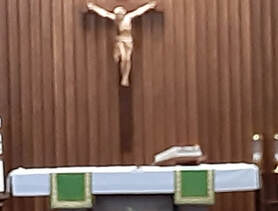 Is it just me, or have the last three and a half months been especially challenging, stretching us in unprecedented ways? This has definitely been my experience, in more ways than one. Working in a long-term care setting at this time can certainly be described as “stressful.” Between being on high alert, sanitizing surfaces and taking temperatures, etc. to dealing with tensions that arise from people being frazzled and exhausted, to facing uncertainty and seemingly constant changes, these times certainly take their toll on a person. I am reminding myself, as I write this post, to be careful not to let this stress get the better of me! (I’ll admit that it has, on occasion, in the past.) I need to try not to be short or unkind with others as a result of the pressure. I am so grateful for the fresh start given in the Sacrament of Reconciliation! I’m glad, too, that all of this struggle does not go to waste. Years ago, I learned to offer all this “stuff” of my daily life, the “prayers, works, joys, and suffering,” as well as any concerns, placing it on the altar (in my mind’s eye) at the time of the offertory at Mass. Not only can I bring these challenges to Jesus during private prayer in front of the tabernacle (or throughout the day), I can also lay them all before Him, on the altar, when “assisting” at Mass. 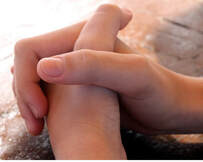 This morning, as we finished the first Mass at St. Anne’s since March 18th, the closing response seemed especially appropriate! Due to the ban on visitation in light of COVID-19, St. Patrick’s Day was the last time we were actually able to have Mass celebrated here. Yesterday afternoon, we learned that a priest who recently moved in here was interested in offering Mass here on the morrow at 9 a.m.; it would be open to us and our residents. I’d have to dust off my sacristan hat in a hurry! I had to make sure the wine and hosts were still good, and change the lectionary and missal from Lent to the twelfth week of Ordinary Time. I had to find a Mass stipend, and attend to other details. I guess, I was still a bit rusty because, at 8:58 a.m., Father asked me if I was going to light the candles. After struggling to light the new lighting taper, I finally got the candles lit. (Fire Hazard Warning: You cannot blow out a match while wearing a mask. Make sure to take off your mask before working with matches to avoid burns or uncontrolled flames.) I got back to my seat and remembered that I needed my bell to ring at the epiclesis and consecration. Back to the cupboards I went!) Other than that, everything went very well. We felt so blessed to have Mass here once again. It was wonderful! I really am blessed! Despite living in a very challenging time, I have so gifted! Along with the greatest blessing of life and the sacraments, God continues to bless me in so many ways; if only I would remember that more! I’ll share a couple of timely examples: This week, we received a donated Baldwin piano! We’re having trouble with the electric piano we have, and I’ve been dreaming of a real piano for a while now. Now, this dream has become a reality! I’m looking forward to playing it for our residents Sunday afternoon. Also, a friend of ours has offered me the use of her private swimming pool. This evening, I’m finally going to be able to take advantage of it! This is very exciting because I’m a little fish (I love the water), but rarely get to swim anymore. As if that weren’t enough for a list of blessings, we are getting company this evening for tomorrow’s board meeting. I am very much looking forward to a visit from three of our Sisters. With all of this in mind, especially the blessing of having Mass in our own chapel again, it was with great fervor that I responded to Father’s closing statement: “Thanks be to God!” 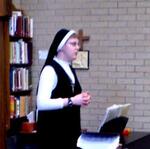 This evening, as we were praying vespers, one of the antiphons struck a chord with me, reminding me of a song I learned during my college years: “To the King of ages, immortal and invisible, be all honor and glory, alleluia.” This song (paraphrased from 1 Timothy 1), has always been powerful in lifting my heart up in praise. Since praying the antiphon this evening, now, that song has been coming back into my mind - it’s kind of catchy. (Sometimes, not being able to get a song out of your head can be a good thing, too.) I was also struck this evening at how many times the prayers referred to God’s kingship. During this time of seemingly unprecedented realities, this “age” of physical distancing, wearing masks, staying home, and rising numbers of ‘confirmed cases,’ it is good to remember that Jesus is truly the king of ALL ages. He is with us as he promised “even until the end of time.” Also, to quote another song we can remember that “He’s got the whole world in His hands.” This is good news which can inspire our hearts to break into praise even (or especially) during the “age” of COVID-19. “To the King of ages, immortal and invisible, be all honor and glory, alleluia.” 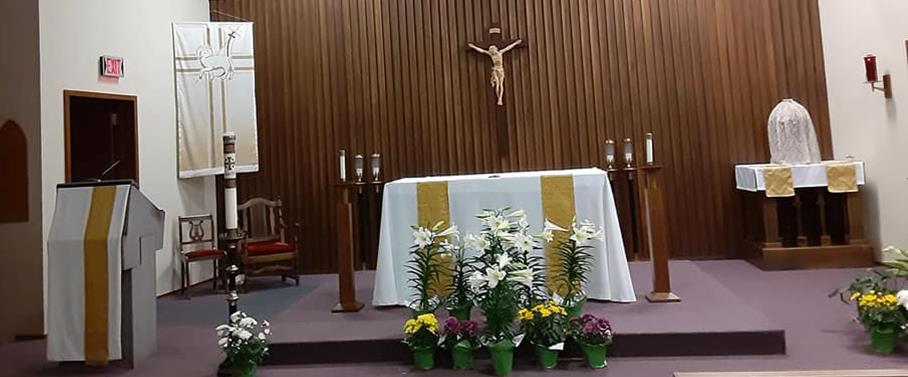 This morning, during the Mass live-streamed from the local parish church, my ears delighted on hearing the notes of the "Easter Alleluia," as Sister Elaine calls it. (This particular musical setting was used at the Easter vigil when she was young.) Other than at last weekend's Masses, this was the first time I had heard the alleluia sung for several weeks. (We don't get much of that during Lent, you know.) It was so beautiful to here this joyful song of praise amidst the turbulent times we are facing. Here we were, watching the Mass on a large screen (in a gathering of less than ten people), still singing this age-old canticle of praise. Long ago, the psalmist sang this ejaculation, lifting up heart and voice in thanksgiving. This morning's alleluia was a fitting reminder to me, during a twenty-first century pandemic, that it is truly "right and just" at all times to give thanks and praise! 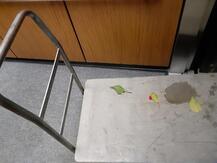 This afternoon, the moment arrived, which had seemed to be looming somewhere in the distance: the time to remove all of the poinsettias from our chapel. They'd been there for two months, since Christmas, and were still doing alright. There was no botanical malady causing their demise; flowers are not allowed for church décor during Lent (except for on a few special occasions), so this Fat Tuesday or Mardi Gras was slated to be their last day to enjoy the warmth and beautiful home our chapel offered. It was good to get this done today, rather than waiting for the morning...We are now prepared to be in accord with liturgical norms, it is true. However, I did have another reason for taking action in this matter today: this is one less thing I will have to take care of in the morning. I have the full length violet altar cloth draped across the table in the little private dining room down the hall. Before I get on with the rest of my day (prayer, Mass, reception desk duty, etc.), I'll have to change things over in chapel from ordinary time to Lent. Down will go the green trim on the altar and ambo. The green tabernacle veil will be exchanged for white. The huge violet altar cloth will go on. (Hopefully, most of the creases/wrinkles will have come out of it in the day and I half that it :hung out" in the other room - I really don't want to have to iron!!) I'm hoping I can get myself going early enough in the morning (after working until 10 tonight) to get all of this done and still have time for private prayer before everyone else gets over to St. Anne's for morning office at 6:30 a.m. Your prayers for me would be appreciated as we start this season of Lent. 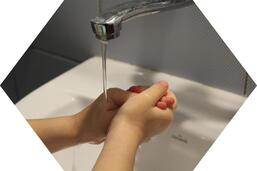 In St. Anne's Chapel In St. Anne's Chapel This line from one of my favorite hymns (Lord, Who at Thy First Eucharist) has come to mind for me in recent days. Saturday, we finished the week of prayer for Christian Unity as we celebrated the feast of St. Paul's conversion. This past week, we've had a visitor from out west, a family member of one of our residents. It has been a pleasure getting to know her a little. Her willingness to share her Christian faith and her love for our Lord have been an inspiration to me, although she is not Catholic. I invited her to join us for Mass Sunday morning, and she said she might do that. I actually ended up sitting near her for much of the liturgy, although I did have to get up for the reading and psalm, etc. As the Mass proceeded, I wondered if she knew that she wasn't supposed to receive Communion, and how to handle this without hurting her feelings or causing a stir. I really hoped I wouldn't have to do anything, and prayed for the situation. The whole situation was resolved seamlessly. At communion time, she stood, watching people, clearly unsure of what to do. I was able to whisper to her that she could just be seated, and that settled things. I was grateful. It is sad, to me, though, that there is lack of unity between Christians, that our brothers and sisters who share our love for Christ and faith in Him, are not able to share also in the richest of His blessings, the other sacraments and especially the Eucharist. Please join me in praying for unity of Christians and that our separated brothers and sisters may find the fullness of the faith. The words of the above-mentioned hymn can be a beautiful prayer to this end and can provide rich content for meditation. I know that, officially, it's called Gaudete Sunday, but since my childhood (before I knew the Latin term), I've called it "Pink Candle Sunday." I so enjoy the rich liturgical traditions of our faith! We get to rejoice in the midst of our Advent waiting.
Although it was extra work on an already busy day yesterday, I wanted to make the most of things for the morrow's celebration...I ironed rose colored paneling to accent the front of the altar (this proved to be more complicate than I'd anticipated.), and found a rose colored chasuble for Monsignor to wear. Although, the color is referred to as "rose," it always looked pink to me. I remember a priest back home stressing the fact that it is not pink but rose. In this, I can't help but recall my dad's (whose birthday we remembered yesterday) facetious remark that "real men can wear pink." (He had a pink shirt, himself.) This morning, I dug in the sacristy drawer and found a rose colored chalice veil as well. I was happy! (I'd thought we had one, but couldn't remember for sure.) I hope you, too, rejoice, at this beautiful time of year as we sing, "Rejoice, rejoice, Emmanuel shall come to thee, O Israel!" This blog just moved here, but it started several years ago.
To view older posts, please visit: https://ndfranciscans.weebly.com/blog and https://ourfranciscanfiat.wordpress.com |
Archives
October 2025
|

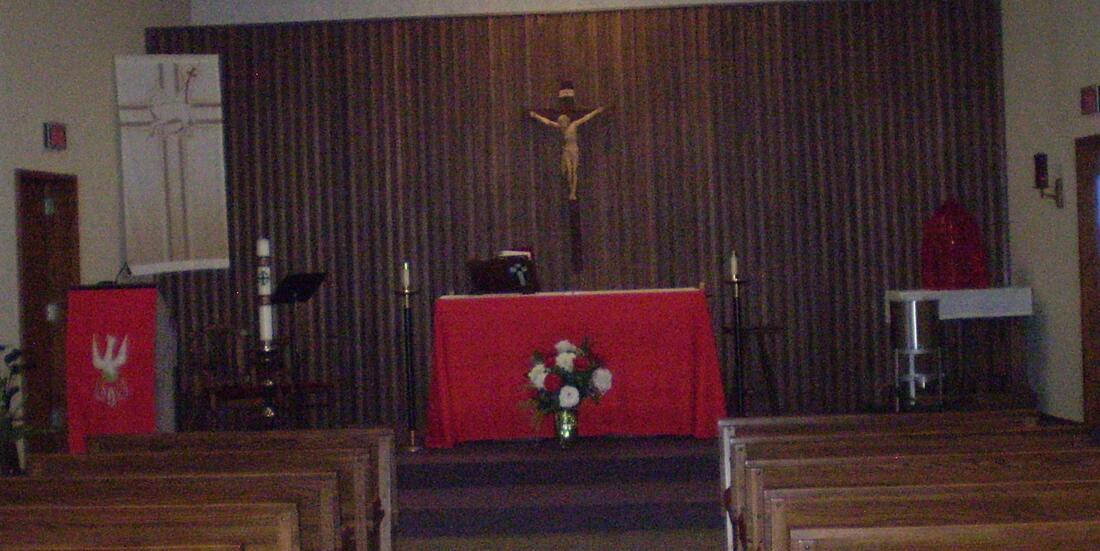
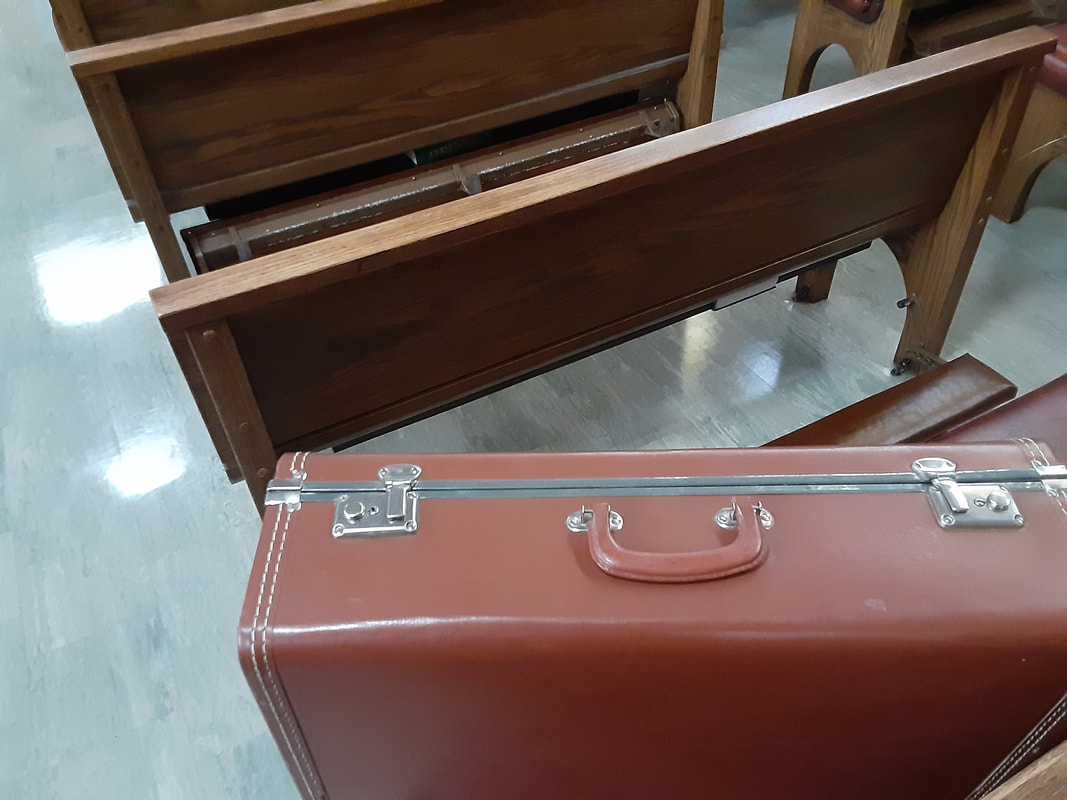
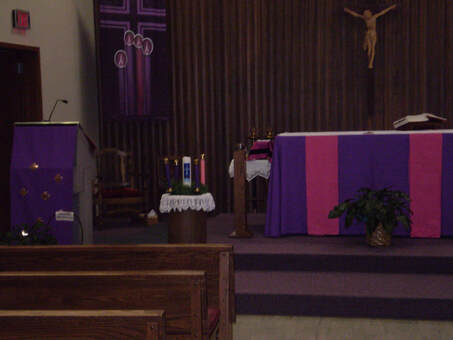
 RSS Feed
RSS Feed